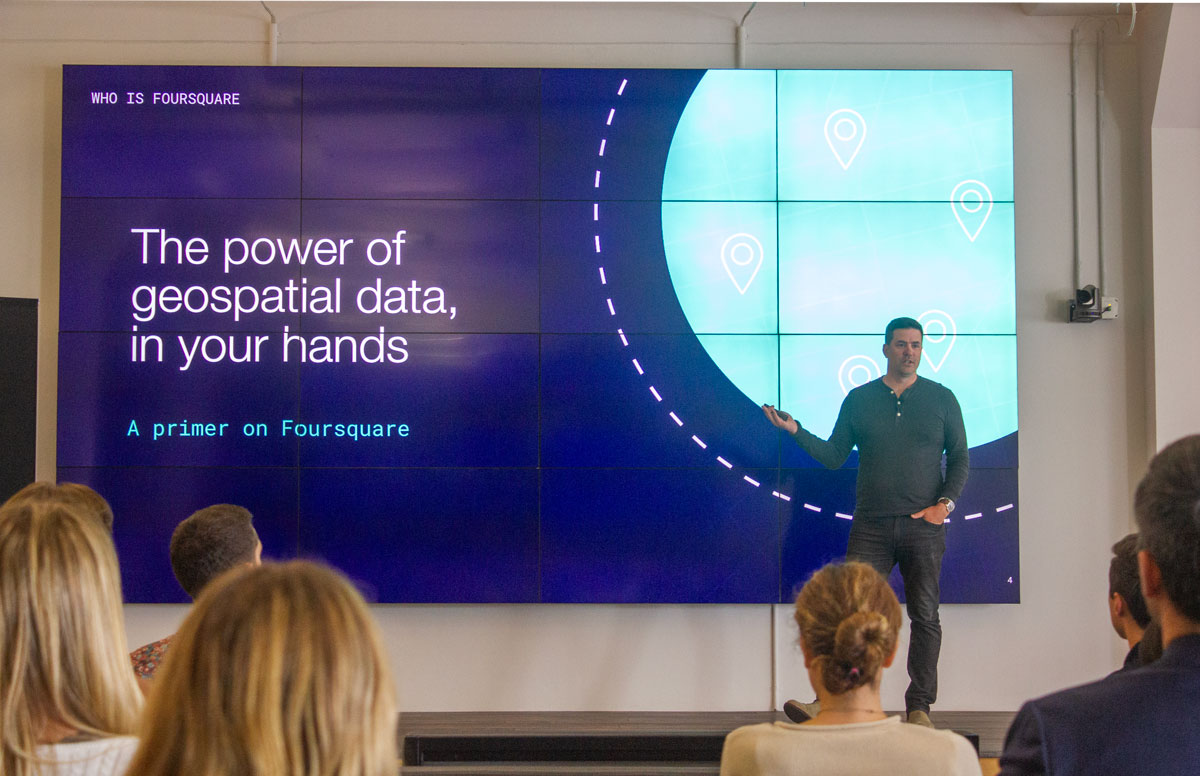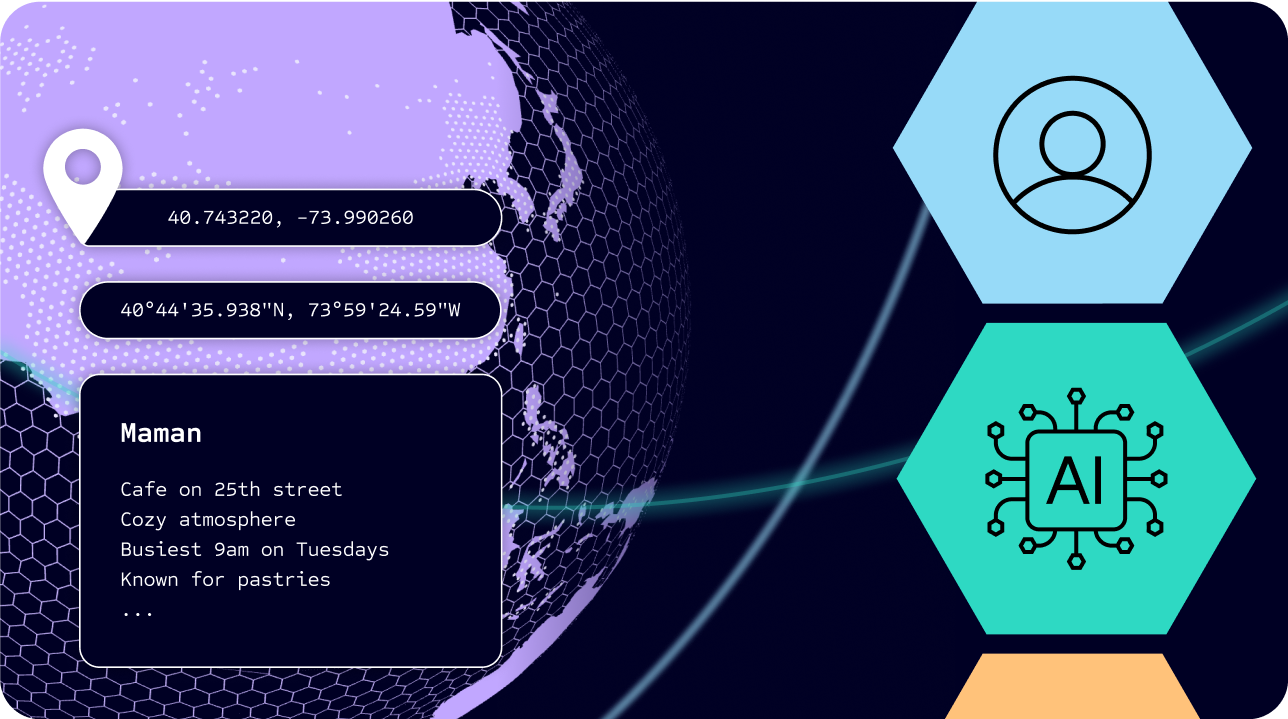When the economy suffers and times of crisis arise, businesses look to survive by finding places to cut costs. Too often, this involves scaling back investments in innovation and doubling down on what has worked in the past. However, companies need innovation to keep up with the rapid and drastic changes brought on by economic downturns, or risk losing in both the short and long term.
Let’s explore what past periods of economic turbulence can teach us about the importance of innovation during tough times, with a particular focus on how location intelligence can help organizations not only survive in a crisis, but thrive.
Making tough choices: why investing in innovation during economic uncertainty is better for long-term growth
Economic downturns are pivotal moments for businesses. Across industries, organizations are faced with difficult choices about where to cut costs and optimize resources. While most leadership teams respond by cutting spend, particularly in new technology, historical evidence actually shows that companies investing in innovation during a downturn fare better in the long term.
The initial impact of a bad economy on innovation
History has taught us that inevitably, some organizations will fail while others manage to overcome the challenges of financial stress. There are many things we can learn from examining past economic events as we possibly prepare to weather one ourselves – particularly the role innovation plays in company survival.
The first instinct during a financial crisis is to cut costs and play it safe. Expenses deemed ‘non-essential’ are eliminated as companies double down on their tried and true strategy for success. While this can mean canceled company retreats and hiring freezes, it also tends to stifle investments in innovation. In June of 2020, a McKinsey survey found that in response to the economic downturn brought about by COVID-19, executives were, “deprioritizing innovation to concentrate on four things: shoring up their core business, pursuing known opportunity spaces, conserving cash and minimizing risk, and waiting until there is more clarity.”
Tightening spend is essential during uncertain times, but pulling back on innovation can actually have long-term negative consequences for an organization. Many of the challenges a business faces in these periods can be analyzed and even alleviated by technology. The same McKinsey report claims that “playing it safe may be a shortsighted decision,” and encourages companies to leverage innovation as they adapt to changing market conditions and prepare for the future.
History shows that investing in innovation is better long term
A Bain study on the 2008 recession and its aftermath led partners to conclude that, “the eventual winners in any downturn are companies that aggressively captured the opportunities unique to recessions.” The study shows that one of the main ways companies can go on the offensive is by finding innovative solutions to the challenges brought about by a bad economy. McKinsey’s survey also looked at the 2008 crisis as a data point, where results showed that companies investing in innovation during the recession outperformed those that did not by more than 30% in following years.
“The companies that power into a downturn and accelerate out of it aren’t complacent. They define the scenarios they’re likely to confront and lay bold plans to profit from whatever they encounter.” – Bain
McKinsey found that companies that invested in innovation and technology through the 2008 recession not only out-performed non-innovators by 10% during the crisis, but continued outperforming them by upwards of 30% in the following years.
Similar research suggests the same. An article published in 2022 by Northwestern University’s Kellogg School of Management argues that economic crises are more nuanced than we think, and that strategic investments in innovation can determine which companies will thrive, merely survive, or not endure at all. Harvard Business Review (HBR)’s 2019 examination of past recessions and company outcomes found that, “any of the companies that merely limp through a recession are slower to recover and never really catch up.” In other words, hunkering down and withholding investment in innovation can help preserve cash in the short term, but seriously damage a company’s ability to grow in the future.
The case for innovation during a crisis: short-term benefits to investment
Innovating during an economic crisis is not only beneficial in the long term. Oftentimes, companies that invest in innovation during a recession perform better in following years because of the short-term benefits of innovation – mainly increasing operational efficiencies and leveraging technology to adapt in a changing market.
Preserving resources by improving operational efficiencies
Regardless of the economy, innovation is often geared toward increasing operational efficiencies that drive growth. So while saving cash by not investing in tech may seem like a smart short-term solution in tough times, it can prove detrimental when considering the resources that could be saved by empowering employees and business processes with innovative solutions.
Businesses that continue investment during an economic crisis avoid missing out on technological developments that will be beneficial when the crisis is over, and instead can emerge as leaders in innovation. In fact, HBR says that, “the resource scarcity that typically accompanies recessions forces innovators to do things they should have been doing already.”
For many companies, this means accelerating digital transformation to increase efficiencies and cost savings. During the height of the COVID-19 pandemic, organizations made steep investments in technology to help their teams be productive at home, things like video conferencing, project management, and instant messaging tools. While investing in these technologies was an expense, doing so enabled these companies to create a productive environment for remote work, weather the storm, and emerge from the pandemic well-adjusted to a hybrid world.
“Crises are like adrenaline for innovation, causing barriers that once took years to overcome to evaporate in a matter of days. Entrenched orthodoxies on ‘the way things are done’ are replaced with ‘the new way we do things’ almost overnight.” – McKinsey
Adapting to a changing market
It’s important to remember that an economic downturn does not only affect a business; it affects that business’ customers, its suppliers, and other critical players that allow an organization to function. Filippo Mezzanotti, Associate Professor of Finance at Kellogg, emphasizes that, “these are times when people are forced to rethink the way they’re organizing their life, their business, or their activity.” Given these changes, doubling down on what worked before a crisis is actually not a safe bet. Instead, by analyzing the situation and adapting a business model or strategy, companies can come out ahead in a bad economy.
“Many businesses simply cannot operate as they have in the past. What made a company successful historically may no longer be possible during or after the crisis…The assumptions that supported years of stable, predictable growth may no longer be valid.” – McKinsey
HBR points out that, “the first reason to prioritize digital transformation ahead of or during a downturn is that improved analytics can help management better understand the business, how the recession is affecting it, and where there’s potential for operational improvements.” Investing in innovation can help companies understand how their business must change to meet evolving customer needs, identify areas of opportunity, mitigate risk, and double down on what really moves the needle.
Leveraging location intelligence to adapt and grow during strenuous times
There are many different innovative solutions companies can invest in during financial turbulence, and prioritizing should ultimately depend on the needs of each organization. As pointed out before, investing in tools that enabled remote work was key for some businesses to survive during the lockdown stage of the pandemic. However, one area of technological investment that is always a safe bet, regardless of the economic landscape, is location intelligence.
Let’s again consider the two main short-term benefits to investing in innovation: increasing operational efficiencies and adapting to a changing market. Location intelligence provides organizations with the insights they need to optimize operations and tighten up spending on nonessential initiatives. For example, with geospatial data and mapping tools, retailers can visualize where their customers are in relation to top performing stores and reallocate resources to support these locations.
Understanding how locations must adapt to changing customer needs is also imperative for retailers in these times. As we saw during the pandemic, many people relocated outside of urban areas. If retailers did not realign their strategy to meet the changing customer landscape, and instead doubled down on old assumptions, it’s likely they did not fare well. Location intelligence data and tools enable organizations to stay up-to-date with a dynamically changing world and to adapt their strategies accordingly. The insights derived from location-based analysis give companies the information they need to weather tough conditions, while also laying a solid foundation for succeeding in a changed market when the crisis resolves.
Making tactical adjustments quickly will not only help a company make it through a downturn, but also set them up for long-term success in a changed market. At Foursquare, we deliver high quality location intelligence solutions for businesses across industries. Many of the workflows our customers utilize most become even more critical as the economy shifts. Here are a few examples of how common location intelligence use cases increase in importance during financial duress, and why investing in geospatial technology and data is a smart way to spend when trying to save.
Site selection
Real estate is a large expense for many businesses, particularly during a crisis. Understanding how local market conditions impact specific store locations can help companies make informed decisions about which venues to close, and what that impact will be on overall operating expenses. For instance, a restaurant chain may need to cut costs by choosing a location to close. Location intelligence can identify which neighborhood is most likely to underperform in a time of crisis- making it an ideal tool for site deselection.
Predictive modeling
Bain’s study emphasizes that stress testing and modeling different scenarios can help companies adapt quickly both during and after a crisis. This is particularly valuable for organizations as they navigate an uncertain economy and prepare for multiple outcomes. For example, if a nearby competitor is closing a store, geospatial data can predict how the closing might impact your own store’s performance. Similarly, forecasting sales based on possible changes to customer needs can reveal new market opportunities and mitigate risk.
Trade area analysis
As stores open or close, consumers migrate, and customer needs evolve. This means change for trade areas. Geospatial data can reflect these changes to give businesses the necessary tools to adapt their strategies in response. Consider the dramatic drop off in commuting that occurred during the COVID-19 pandemic; trade areas around popular office lunch spots suddenly became irrelevant. Instead, these lunch spots had to adjust their trade areas to include people now working from home nearby, or perhaps even pivot to a delivery model. Assuming pre-crisis trade areas are still intact can result in misallocated resources and lost opportunities. Location intelligence can help avoid these costly mistakes.
Product development & sales enablement
All of the dynamic factors that result from a changing economy can actually be an opportunity for companies to develop new products or discover new sales channels. HBR says that, “downturns can be great times to introduce offerings that connect with consumers who have tighter purse strings or are naturally frugal given continued uncertainty,” and that there is an opportunity to create solutions for challenges posed by a crisis itself. With geospatial insights, a company can identify target markets for new products or services aimed at solving new problems. As an example, a consumer packaged goods (CPG) brand can layer various geospatial datasets together to identify stores where their new discount products would be most successful.
Competitive intelligence
Companies understand the ins and outs of their own business, but often struggle to maintain the same level of intelligence about their competitors. During an economic crisis, keeping tabs on the competition is essential to making informed decisions. With geospatial data and tools, companies can visualize where their competitors are located, where they are closing stores, and determine how that ultimately impacts their own business. McKinsey points out that economic crises are also times when companies pivot and new competitors emerge, so it’s important to stay up-to-date in your analysis.
Supply chain analysis
Customer behavior is not the only factor that changes during an economic crisis. The same economy is impacting all businesses, including those that form the supply chains of others. When a key warehouse or manufacturing facility in a company’s supply chain is closed or repurposed, location intelligence can guide businesses to reoptimize routes and avoid wasteful ‘fixes’ that are not actually the next best option.
Investment insights
Financial firms investing in other businesses rely on data to perform due diligence, monitor portfolio performance, and make decisions on both the buy and sell side. Geospatial data is a critical component to these investment analytics, as it provides firms with an otherwise impossible level of local insight. For instance, if a firm is choosing between two businesses to purchase during a downturn, looking at how consumers are interacting with and visiting store locations enables predictions on how each company will fare during and after the crisis, ultimately helping the firm better hedge their bets and invest in the company with higher growth potential.
These are just a few examples that demonstrate the ways in which geospatial data empowers organizations to make smarter decisions during a crisis. To learn more about the wide variety of applications for location intelligence and how specific companies are implementing Foursquare data in their strategies, explore our repository of case studies.
Placing the right bets by investing in location intelligence
With all of the changes brought about during an economic crisis, companies simply cannot skip out on investing in location intelligence. At a time when every penny counts, it is critical for organizations to understand how the fluid market conditions impact their core business and what they must do to adapt.
To mitigate risk and adapt to a changing market, both companies with a history of innovation and those just beginning their journey are choosing to invest in location intelligence. As a trusted leader in the geospatial industry, Foursquare is a safe bet for organizations looking to invest in innovation and reap both short and long-term benefits. With high quality, up-to-date, and accurate location-based insights, businesses across industries can actually grow during an economic downturn, while setting themselves up for success in the future.
Get in touch with Foursquare today to see how our location intelligence solutions can help your organization survive and thrive during an economic crisis.



